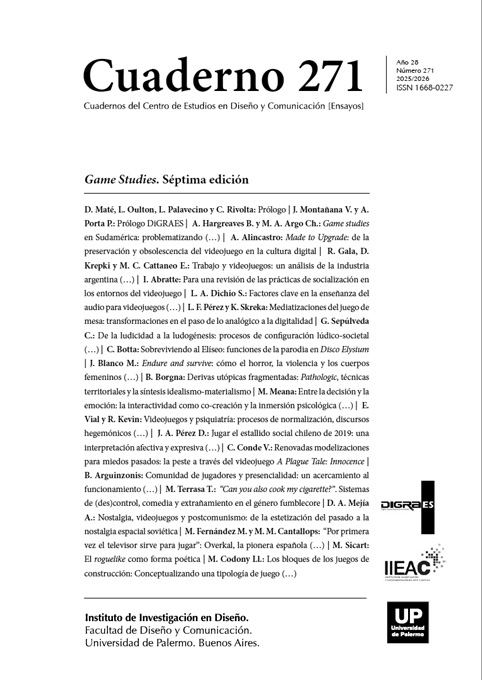El roguelike como forma poética
Keywords:
roguelikes, literary genres
Abstract
This article proposes an analysis of roguelike video games as poetic forms of the video game.
References
Ananny, M., & Crawford, K. (2018). Seeing without knowing: Limitations of the transparency ideal and its application to algorithmic accountability. New Media & Society, 20(3), 973–989.
Anthropy, A., & Clark, N. (2014). A game design vocabulary: Exploring the foundational principles behind good game design (1st ed.). Addison-Wesley Professional.
Apperley, T. H. (2006). Genre and game studies: Toward a critical approach to video game genres. Simulation & Gaming, 37(1), 6–23.
Arcane Kids Collective. (n.d.). Arcane Kids Manife$to. (accessed 18/3/2025)
Arsenault, D. (2009). Video Game Genre, Evolution and Innovation. Eludamos: Journal for Computer Game Culture, 3(2), Article 2.
Bácsné, B. É., Fenyves, V., Bács, Z., Molnár, A., Ráthonyi, G., & Rizwan, H. (2022). Roguelike Games—The way we play. International Journal of Engineering and Management Sciences, 7(4), 80–92.
Barney, T. (2008). Literary evaluation and poetic form: Poetic form and creative tension. In The Quality of Literature: Linguistic studies in literary evaluation (pp. 71–81). John Benjamins Publishing Company.
Anthropy, A., & Clark, N. (2014). A game design vocabulary: Exploring the foundational principles behind good game design (1st ed.). Addison-Wesley Professional.
Apperley, T. H. (2006). Genre and game studies: Toward a critical approach to video game genres. Simulation & Gaming, 37(1), 6–23.
Arcane Kids Collective. (n.d.). Arcane Kids Manife$to. (accessed 18/3/2025)
Arsenault, D. (2009). Video Game Genre, Evolution and Innovation. Eludamos: Journal for Computer Game Culture, 3(2), Article 2.
Bácsné, B. É., Fenyves, V., Bács, Z., Molnár, A., Ráthonyi, G., & Rizwan, H. (2022). Roguelike Games—The way we play. International Journal of Engineering and Management Sciences, 7(4), 80–92.
Barney, T. (2008). Literary evaluation and poetic form: Poetic form and creative tension. In The Quality of Literature: Linguistic studies in literary evaluation (pp. 71–81). John Benjamins Publishing Company.
Published
2025-06-05
How to Cite
Sicart, M. (2025). El roguelike como forma poética. Cuadernos Del Centro De Estudios De Diseño Y Comunicación, (271). https://doi.org/10.18682/cdc.vi271.12392
Section
Artículos
Los autores/as que publiquen en esta revista ceden los derechos de autor y de publicación a "Cuadernos del Centro de Estudios de Diseño y Comunicación", Aceptando el registro de su trabajo bajo una licencia de atribución de Creative Commons, que permite a terceros utilizar lo publicado siempre que de el crédito pertinente a los autores y a esta revista.


